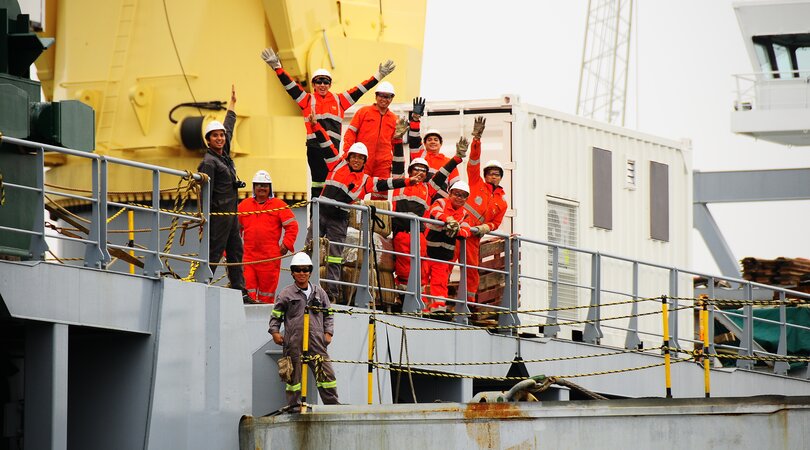Our new NorthStandard site is now live. There will be no new content or updates added to this site. For the latest information, please visit our new site north-standard.com.
Article: Crew management - patterns for the future
Sudhir Malhotra, Senior Surveyor at Standard Club, takes a look at the way in which shipping is changing – and crews along with it, in this article published by Maritime Risk International.

Shipping is undoubtedly one of the most life-changing career choices an individual can make. The choice is usually made when a person is young and impressionable, mostly in their teens, and often the person joins ships with the vision that they will see the world, build up a solid career and be reasonably well paid for their efforts – a challenging, adventurous and fulfilling career choice.
Notwithstanding the above, individuals embed themselves in the gears and cogs of the world supply chain when they join the merchant navy and become an integral part of the system that commercially delivers goods, energy, and commodities across the globe. Shipping’s ability to offer economic and efficient long-distance transport puts it at the centre of the world economy.
As noted by the International Chamber of Shipping, the impact of shipping and world trade and the prosperity it generates cannot be underestimated. Some 11 billion tons of goods are transported by ships each year. As of 2019, the total value of the annual world shipping trade had reached more than 14 trillion US Dollars. Each year, the shipping industry transports nearly 2 billion tons of crude oil, 1 billion tons of iron ore (the raw material needed to create steel), and 350 million tons of grain.
So, coming back to our seafarer who has made this big career choice – where do they find themselves? Whilst they are integral now to the world supply chain, their experience might not be quite what they had expected.
In the real world of commercial shipping, there are immense commercial pressures. After all the ships are being run as commercial units, envisioned by commercial giants who want the operation to be as streamlined and as cost effective as possible – they want all the ‘fat’ cut out. No delays are acceptable, and time spent in port is only (and only) to ensure that the ship fulfils her commercial contract and is ready for the next loading and voyage. There is very little space for error and the consequences of making errors can be very brutal for the seafarer, they might well lose their job if the ship was delayed due to something they overlooked.
There are only a handful of crewmembers on board – perhaps 20 crew at best. The crew are from varying age groups, and nationalities, and with differing job profiles and ranks. Does anybody have the time to really interact with one another anymore?
In addition, there is the hierarchy and discipline that comes with working on a ship. A traditional rank structure and often an implicit blame culture that leads seafarers to feel sometimes that it is better to be quiet and just go with the flow, retreat into their shell, and avoid asking too many questions as it might make them look stupid and unprofessional.
Despite my critique, shipping is by no means a wrong career choice. It teaches young individuals how to shoulder responsibility and gives them an opportunity like no other profession can to experience the world, work with different cultures, and form bonds with relative strangers towards a common goal; the smooth running of their ship, and with it powering the world economy and supply chains. Within months of joining ships, those same persons would have acquired the ‘can do’ attitude and the sought-after skillset of getting the job done and adapting to a new environment which despite the challenges is fascinating and adventurous. The ship never stops, and the seafarer is the invisible catalyst without whom world trade would come to a grinding halt.
Unfortunately, the Covid-19 crisis has dealt a hammer blow to the morale of seafarers. The uncertainty for seafarers being unable to sign on and off ships, the volatile covid situation, the changing quarantine requirements despite being vaccinated, and the poor treatment of seafarers by many port authorities and nations who have refused to allow crew changes on their soils, have all added to these indispensable ‘key workers’ woes.
Patterns for the future
We have touched on the many problems seafarers are facing these days.
In the sixties and seventies, seafaring was very different to what it is today. Ships were a lot smaller and there were more crew members on board. Voyages were usually longer which allowed time for camaraderie and for crew to interact and bond with one another and socialise in their off time.
These days there is hardly any time for interaction between the crew who are becoming increasingly isolated and withdrawn from one another.

A 2019, a pre Covid-19, study by Yale University on 1,572 seafarers had identified potentially dangerous levels of depression, anxiety and suicide risk amongst the world’s seafarers. Within two weeks of completing the survey, preliminary results indicated that 25% of respondents had suffered depression, 17% had experienced anxiety, and 20% had contemplated suicide or self-harm.
The Seafarer Happiness Index report, sponsored by Standard Club, reveals startlingly similar results in the Q2 2021 report results which saw happiness levels dip from 6.46 in Q1 to 5.99/10, a steep and concerning drop.
These are worrying statistics indeed and considering the Yale study was commissioned in 2019, pre-pandemic, it would only suggest that the situation is far worse today as the Covid pandemic has certainly exacerbated the issue.
It therefore becomes incumbent on crewing managers to recognise this growing risk and to put the right emphasis on seafarer wellbeing. In response to the unprecedented crew change crisis created by the Covid-19 pandemic, the Neptune Declaration on Seafarer Wellbeing and Crew Change was signed by Standard Club alongside the shipping fraternity in December 2020. To make tangible improvements to seafarer wellbeing and crew change the Neptune Declaration suggests the following actions:
- Recognize seafarers as key workers and give them priority access to Covid-19 vaccines.
- Establish and implement gold standard health protocols based on existing best practice.
- Increase collaboration between ship operators and charterers to facilitate crew changes.
- Ensure air connectivity between key maritime hubs for seafarers.
A group of charterers from both the wet and dry bulk sectors have outlined a set of best practices they have used to turn the Neptune Declaration recommendations into action.
In 2020, the International Maritime Organization had to ask governments to designate seafarers as key workers, to allow them to negotiate travel restrictions and put them in line for priority vaccinations.
Notwithstanding Covid, in this age of cheap consumer electronics, crew tend to bring in their own personal electronic gadgets (such as tablets, laptops, smart phones, and gaming devices) onboard when they join the ship. These gadgets which are used for entertainment and connecting the seafarers with their family members, inadvertently leads to them spending more time within their rooms and away from the rest of the crew. While such behaviour is a reflection of our time, seafarers should resist the temptation to isolate themselves further and should aim to connect with their peers whenever possible. Human beings are social animals and not isolated islands – connecting with one another would surely help ease some of the anxiety, depression, and negativity and would help build the trust, bond, and camaraderie that seafarers desperately need today.
Crewing managers need to consider how the issue of crew isolation can be tackled. Perhaps a focus on making the common and recreation areas a more desirable place, with some internet access, and physical and electronic games, which would help bring the crew together. Whilst internet access on some ships may seem a privilege, it could be useful to consider better (yet controlled) internet access in common areas as a solution to tackle crew isolation.
Ensuring a culturally inclusive environment on board is another area for crewing managers to focus on in order to improve wellbeing standards on board. The phenomenon of manning a ship with a culturally mixed crew is not new in the shipping industry but it can easily lead to potential misunderstandings or miscommunication issues amongst them. According to a study by World Maritime University, cultural complexity on ships has become an issue of attention, since a growing number of maritime accidents are attributed to ineffective communication and misinterpretation of different behaviours on multilingual and multicultural vessels. Boosting a culturally aware environment, developing a global mindset, improving language skills, and promoting an appreciation of cultural differences are some of the ideas that crewing managers could consider in helping educate their crew about cultural diversity and inclusion.
Moreover, seafarers should be encouraged to speak up and should be empowered to express their opinions when they are with their superiors. This would make every marine adventure safer, as such discussion would contribute towards better communication and a shared mental model amongst the crew.
Finally, it is my message to all seafarers out there that you are not alone. Regardless of how you are feeling, never do anything foolish. Should you need anyone to talk to there are numerous support organisations operating 24/7 international hotlines you can reach out to. As you are reading this, international organisations and governments are doing all that they can to ensure you can work and return home safely to your loved ones.
Category: Loss Prevention

